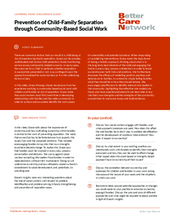There are numerous factors that can result in a child being at risk of experiencing family separation. Issues can be complex, multifaceted and involve child protection, family functioning, service access and poverty related concerns. In many cases, the outcome for a child, in particular whether separation is successfully prevented or not, is as contingent upon the approach employed by social workers as it is the underlying factors at play.
In this video, Grace Mwangi, a Program Consultant with Lumos, shares key lessons from her experience working in community-based social work with children and families at risk of separation. Grace notes that social workers must first invest time in developing relationships with families and the wider community in order to surface and accurately identify the root causes of vulnerability and potential solutions. When responding to or considering interventions, Grace notes the importance of taking a holistic approach, thinking about what is in the long-term best interests of the child and engaging the family in every step, process and decision in order to foster ownership over both risks and solutions. She furthermore discusses the efficacy of modelling positive practices and behaviours to families, in contrast to simply telling families what they should do or how they should behave. She encourages practitioners to identify relevant role models in the community, highlighting that effective role models are those who have experienced adversity yet been able to tap into their own strengths and the strengths of the community around them to overcome issues and build resilience.
This video is part of a series of practitioner learning videos from Kenya.
For more practitioner learning videos, watch our Cambodia and Uganda series.

